The Rocky Mountaineer is a luxury rail service running on four routes in western Canada. Journeying on the train is a comfortable way of seeing the region’s landscapes and wildlife. This year, with Canadians celebrating 150 years since Confederation — the act that united Britain’s North American colonies and is regarded by residents as the birth of their nation — rail travel seems a particularly fitting as a way of exploring this vast and scenic country.
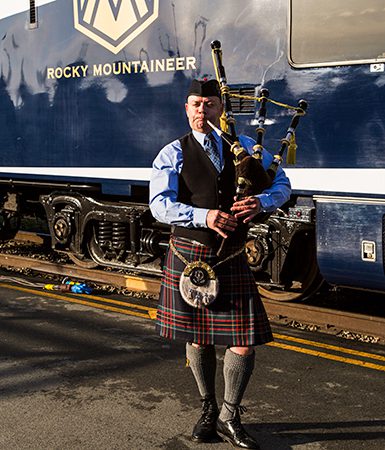
Bagpiper plays in front of Rocky Mountaineer
Some people speculate as to whether British Columbia would today even be a part of Canada if it wasn’t for the Canadian Pacific Railway. It could well have joined the United States of America, rather than the Dominion of Canada, if politicians in the eastern Provinces hadn’t agreed to the enormous undertaking of financing its construction.
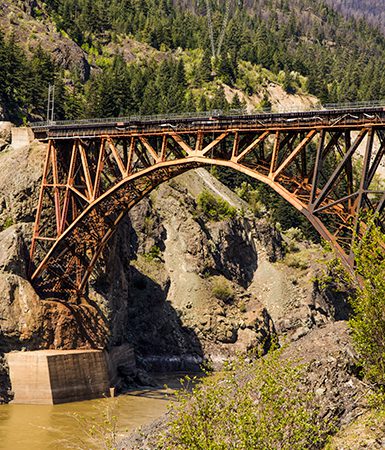
Cisco Crossing over the Fraser River
In the late-19th century, an age when powered air travel was still a distant dream, the railway represented the only feasible method of rapidly transporting people and goods across the continent. Even today it takes four-and-a-half hours to fly the 3,350 kilometres that separate Vancouver and Toronto. Rail aficionados may prefer to cover the ground between the two cities with a journey aboard The Canadian, the train that takes just shy of three-and-a-half days to cover that distance.
The Rocky Mountaineer began operating in 1990 and now carries well over 100,000 passengers a year. It has become recognised as one of the world’s great train journeys and is an aspirational travel experience. The First Passage to the West skirts a scenic, 600-kilometre route between Vancouver and Banff over two days.
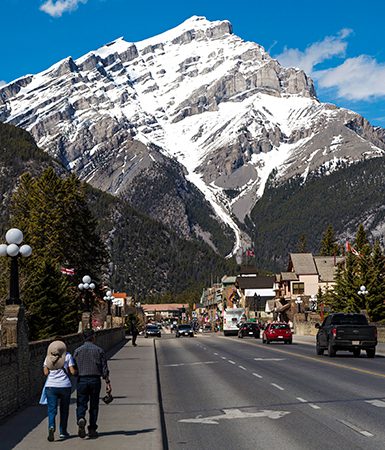
Looking down Banff Avenue in the town of Banff
It passes numerous points noteworthy for rail enthusiasts, including the Cisco Crossing, where both the Canadian Pacific and the Canadian National Railway lines cross the fast-flowing Fraser River. Arguably the most significant is Craigellachie, in British Columbia, the place where the final metal spike was ceremonially hammered into the track to complete the construction of the Canadian Pacific Railway on 7 November 1885.
Travellers on the train are unable to disembark to visit the Last Spike Gift Shoppe and memorial cairn, but they can snap photos of visitors waving at the train, whose distinctive gold and blue livery makes it popular with photographers as it rolls through the countryside.
Guests travelling from west to east are invited to board the train at a dedicated terminal on the edge of Vancouver. A smartly turned out gentleman in Scottish national dress, complete with kilt and sporran, plays the bagpipes, piping passengers aboard. As the train accelerates away from the station non-travelling members of the Rocky Mountaineer’s staff form a guard of honour to wave off guests — a scene that prompts many onboard to reach for their cameras and click the first of many photos during the journey.
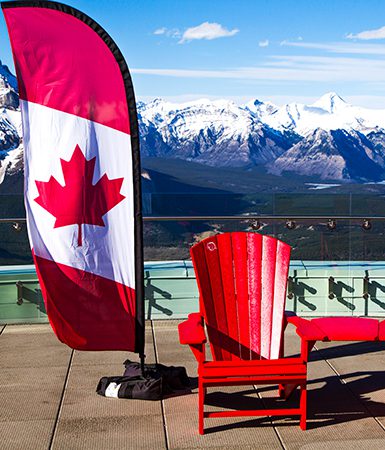
Park Canada views over Banff National Park
Travellers can choose between two levels of onboard service — SilverLeaf and GoldLeaf. Selecting SilverLeaf means travelling in a single-level carriage and being served food at the seat allocated for the journey. GoldLeaf carriages, by comparison, have two floors. Meals are served in the dining carriage on the lower level. Reclining leather seats are ranged beneath dome-windows on the upper level, offering elevated, panoramic views over the landscape through which the train traverses. Those windows, incidentally, are cleaned prior to each day’s travel, to minimise the chance of flecks impinging views or being recorded in photographs.
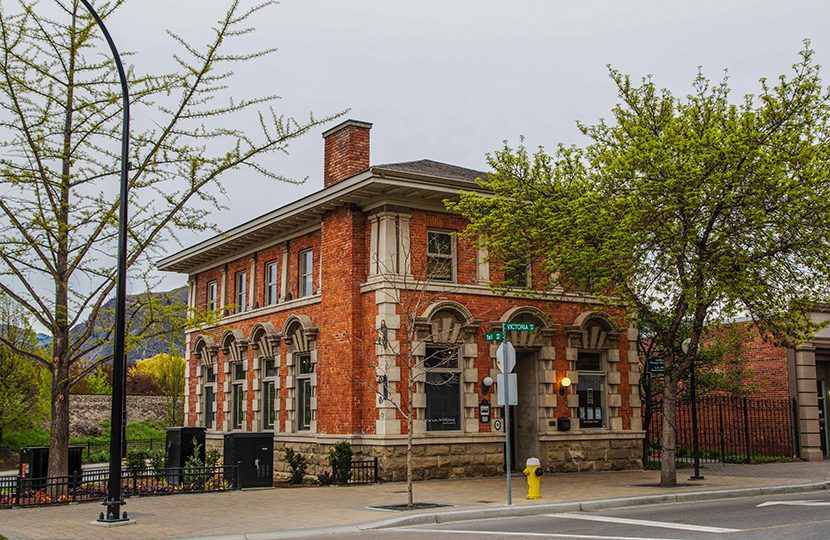
Kamloops Brownstone Restaurant
An enhanced Deluxe GoldLeaf service guarantees the most luxurious guestrooms in hotels. That means staying in an executive suite at the Fairmont Olympic hotel in Seattle, while travelling on the Coastal Passage route, and overnighting in either the five-star Fairmont Chateau Whistler or a deluxe room at the 291-room Four Seasons Resort Whistler while on the Rainforest to Gold Rush route, running between Vancouver and Jasper.
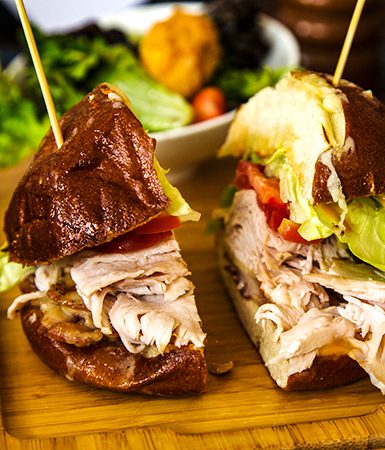
Turkey burger served in the Fairmont Chateau Lake Louise
Guests alight at the end of each day’s journey. For those travelling through the Canadian Rockies, on both the First Passage to the West and Journey Through the Clouds routes, that means spending a night in a comfortable hotel in downtown Kamloops. The four-star Sandman Signature Kamloops Hotel overlooks the town’s Riverside Park, by the confluence of the North and South Thompson Rivers. The DoubleTree by Hilton Hotel Kamloops is another of the properties where Rocky Mountaineer guests can lie down for the night.
Seats aboard the train have lots of leg room, but one of the joys of undertaking a rail journey is that it’s possible to get up to walk around at any point. The carriages have open vestibules at their rears. Keen photographers tend to enjoy spending time out on the vestibule as it means being able to lean out and record images without catching reflections on the inside of windows. It also means being able to breathe in air laden with the fresh scent of pine or spruce while travelling through areas of dense forestation.
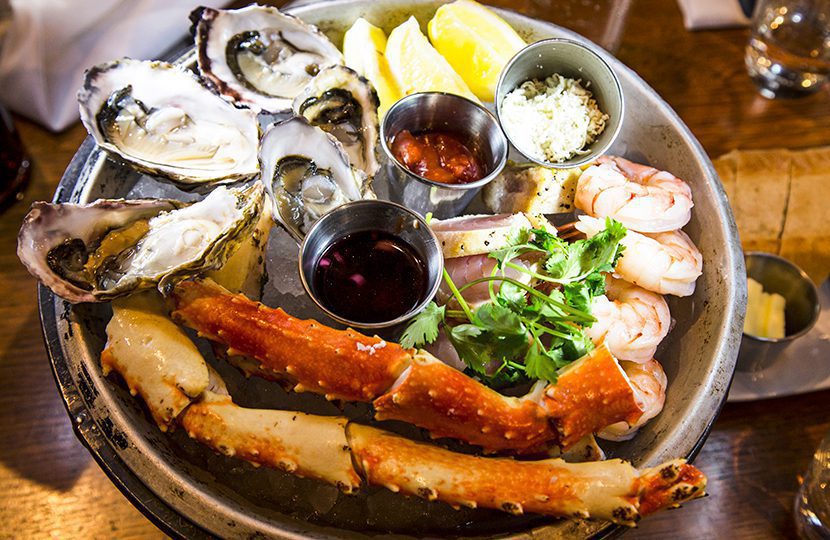
Seafood at Granville Island
One of the disadvantages of spending time on the vestibule is that the rush of air and clacking of the track make it tricky to hear the informative commentaries provided by members of the guest services team as the train passes points of interest or wildlife along the route. Intermittently, the team takes turns to use a microphone to provide travellers with advice when the train is approaching photo opportunities, and recount anecdotes providing insights into the heritage of landmarks. An onboard radio system means that the driver can relay information regarding wildlife sightings, so that guests are ready to photograph animals such as bighorn sheep, bald eagles and grizzly bears — including The Boss, the 250-kilogram male who inhabits territory on the edge of Banff National Park. Though the guest services team commit to memory a lengthy script, they adapt and enhance it according to their personal interests. That means some providing knowledgeable insights into railway history while others give commentaries about the behaviour and lifecycle of grizzlies.
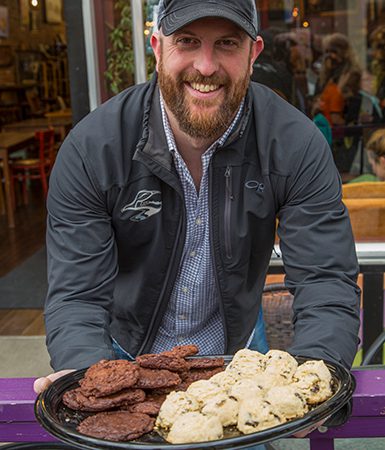
Smiles and cookies during a guided walking tour of Kamloops
Like the mighty bears, who pull leaping salmon fresh from the rivers of western Canada, guests travelling in the GoldLeaf carriages can tuck into locally sourced fish for lunch. The team of chefs working aboard the fleet of Rocky Mountaineer trains sends out around 500,000 plates of exquisitely presented food each year. The cuisine is designed to meet the demands of discerning diners who are no strangers to cruising or fine-dining establishments. The menu includes vegetarian and gluten-free dishes and evolves each season. But old favourites — such as the short ribs, made with Alberta beef — have featured on the menu for years.
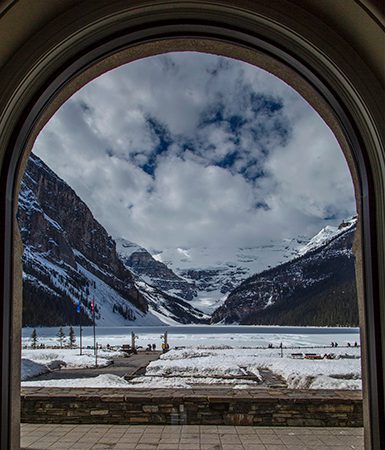
View onto Lake Louise from the Fairmont Chateau Lake Louise
A 10-day tour, aimed at gourmet travellers, is being added to the array of packages offering adventure experiences and sightseeing opportunities before and after journeys on the Rocky Mountaineer. The First Passage to the West Culinary Exploration includes a guided culinary walking tour of Granville Island or the expansive Chinatown district of Vancouver, plus two six-course tasting menus paired with wine. One of those is in the Eden Restaurant at The Rimrock Resort Hotel in Banff, which holds one of the American Automobile Association’s coveted Five Diamond ratings.
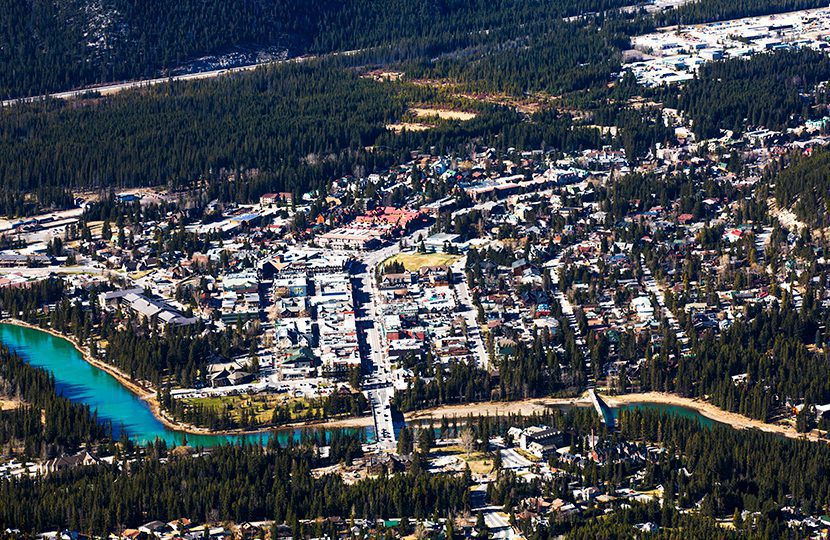
View of Banff seen from the Banff Gondola
Anybody wishing to learn more about the cuisine served in British Columbia can participate in one of the newly introduced guided walking tours of Kamloops, run by ACT Adventures. A local guide points out heritage locations around the city. A gold rush and, of course, the railway played roles in establishing Kamloops. A memorial to the first settlers of European origin, who walked from Winnipeg, stands opposite Brownstone Restaurant, where popular dishes are given a gourmet twist. The starters include poutine — traditionally a comfort food of French fries topped with gravy and curds — featuring wild mushroom, truffle oil and roast chicken. The main courses include locally caught rainbow trout and breast of duck from nearby Brome Lake. The renowned poet Robert Service worked in the heritage building now occupied by Brownstone’s while it was still used as the Canadian Bank of Commerce.
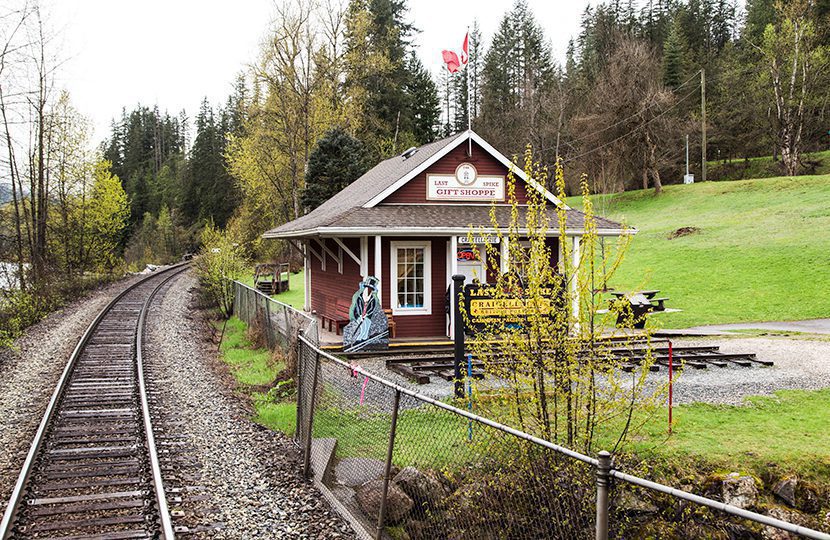
The Last Spike Gift Shoppe at Craigellachie in British Columbia
Banff, the First Passage to the West’s eastern terminus, stands in Canada’s oldest national park and forms part of a UNESCO World Heritage Site. The national park was established in 1885 to encourage tourism to geothermal springs that were discovered, by chance, while railway construction workers took a break on Sulphur Mountain in 1883. The Banff Gondola now runs to the summit of that mountain, where a rooftop observation platform offers panoramic views of the surrounding landscape. Tours of the Cave and Basin National Historic Site are a way of learning about the discovery of the springs. Bathers who enjoy high-end experiences might prefer a trip to the Fairmont Banff Springs hotel’s Willow Stream Spa. The grand hotel has 764 guestrooms and is built in the style of a Scottish manor. Reputedly haunted, it is a national heritage site because of the significance of its role in attracting rail travellers to the national park, over which it has commanding views.
Dining with a backdrop of mountain scenery is also an option at nearby Lake Louise, which was named in honour of the fourth daughter of Queen Victoria — Princess Louisa Caroline Alberta — after whom the province is also called. Sitting in the Fairmont Chateau Lake Louise’s Walliser Stube, where fondue is served, provides views onto the lake and the steep slopes of the Canadian Rockies that rise above it, forming one of the country’s most popular ski resorts.
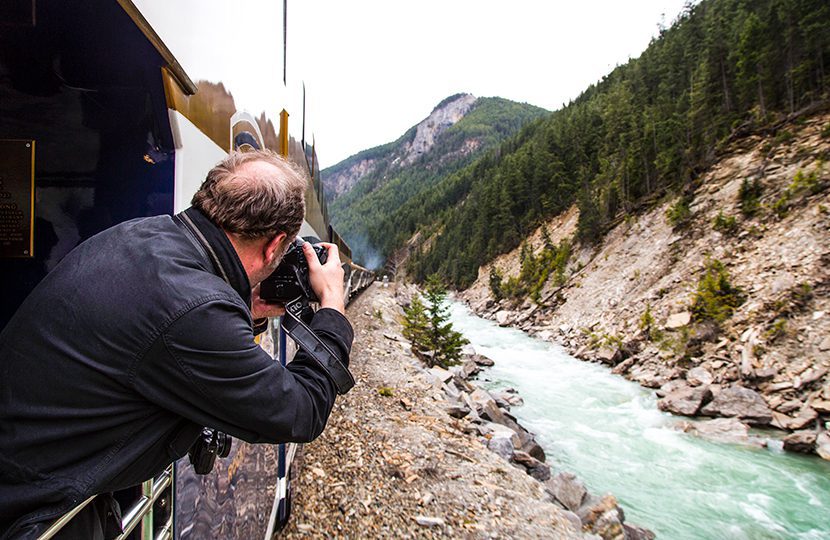
Rocky Mountaineer
Winter sports continue to draw visitors to the mountainous region outside of the season from April until October, when Rocky Mountaineer trains roll across the landscape of Canada’s West.

